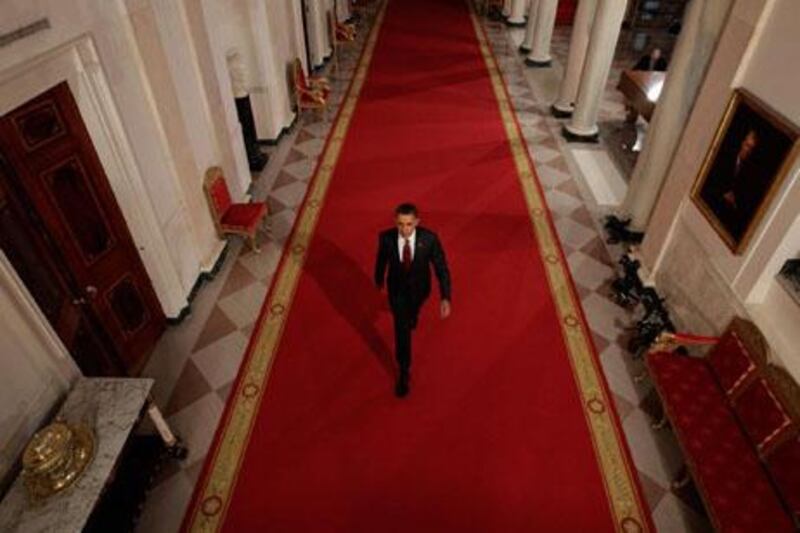NEW YORK // Barack Obama promised yesterday to address the anger of American voters who gave his Republican opponents a commanding majority in the US House of Representatives and gains in the Senate in mid-term elections.
A subdued Mr Obama told a White House press conference: "As president I take responsibility." He said he was eager to sit down with Republican and Democrat leaders to "figure out how we can move forward together".
But on the wide gulf between the two sides, he added: "It won't be easy."
Only two years after his election on a platform of change, Mr Obama seemed to be following the same playbook as Bill Clinton, who suffered massive congressional losses in 1994 and moved to the centre to find areas for bipartisan co-operation.
"What yesterday also told us is that no one party will be able to dictate where we go from here. We must find common ground in order to make progress on some uncommonly difficult challenges," Mr Obama said.
The Republicans vowed to fight Mr Obama to push their conservative agenda, including tax and spending cuts and efforts to repeal healthcare reform.
But they also seemed to recognise their gains came more from a desire by voters to rebuke the Democrats during a time of deep economic uncertainty rather than a wholesale endorsement of their platform.
"Change course we will," said John Boehner, the Ohio Republican expected to replace Nancy Pelosi as speaker of the House and become third in line to the presidency.
The Republican-controlled House will be able to push through conservative legislation, such as repeals to Mr Obama's healthcare reforms, but Democrats in the Senate and Mr Obama's presidential power of veto could still act as powerful brakes.
Mr Obama expressed willingness to work with Republicans on "tweaks" to health care. "If the Republicans have ideas for how to improve our healthcare system, if they want to suggest modifications that would deliver faster, more effective reform … I am happy to consider some of those ideas," he said.
Voters rejected the status quo in Washington just as they did when they chose Mr Obama over John McCain, the Republican nominee to replace George W Bush as president, in 2008. But although the Republicans won at least 60 seats in the House, the Democrats held on to control of the Senate. Harry Reid, the majority leader, fought off a challenge from Sharron Angle, an outspoken conservative from the Tea Party movement.
The Tea Party also lost in Delaware, where Christine O'Donnell failed to pick up a Senate seat after a colourful campaign in which she had to deny she was a witch, and in New York, where Andrew Cuomo won the state governorship and defeated Carl Paladino, a controversial right-winger.
But the Tea Party did make Senate gains elsewhere and the Republican leadership faced the challenge of controlling rebellious new members of Congress, such as Rand Paul in Kentucky, who was demanding tough fiscal control.
Mr Paul, son of Ron Paul, the libertarian Texas congressman, said he was not worried by potential gridlock because debate was "healthy". "It seems like the most fiscally conservative government is always divided government," he said yesterday.
Legislative gridlock would leave Mr Obama unable to push through the kind of legislative reform that marked his first two years in office but could also leave the Republicans open to charges of obstructionism as they prepared their presidential challenge in 2012.
"People want to see results," Eric Cantor, the number two House Republican, said yesterday. "They want to see the government go on a diet just like they have."
Even with the economy suffering from deep malaise and an unemployment rate of 9.6 per cent, these were the most expensive elections so far, with outside groups that do not have to disclose donors spending an estimated $185 million (Dh679m) on Republican candidates, compared with $88m spent by groups supporting the Democrats. The Republican Party spent more than $100m during the campaign, almost double the amount spent by the Democrats.
Foreign-policy analysts expected domestic concerns to continue to top the US agenda but Mr Obama, whose job approval rating in the US was only 45 per cent, might be tempted to seek success abroad by signing long-stalled free-trade deals or achieving Middle East peace.
But Mr Obama's loss of congressional power could embolden foreign leaders unhappy with his agenda, such as Benjamin Netanyahu, prime minister of Israel. "There is no doubt that the outcome of the election has strengthened tremendously the pro-Israeli elements in the US at large, in the House of Representatives, in the Senate and throughout the political establishment, Yoram Ettinger, a former Israeli diplomat, said.






